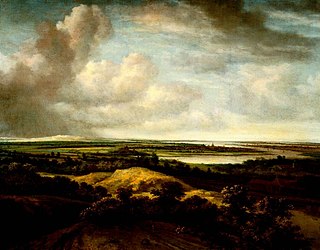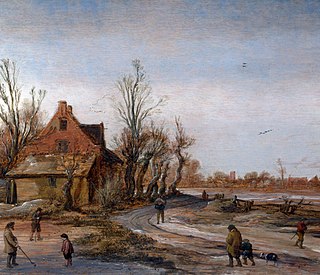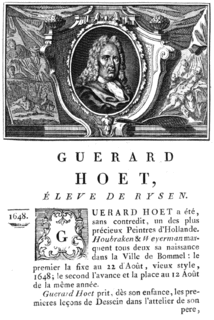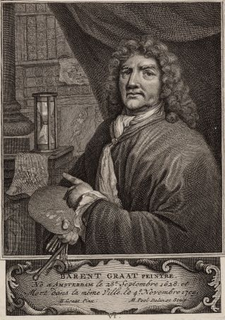
Gerrit Battem or Gerard van Battum (ca. 1636 - October 24, 1684 (buried)) was a Dutch landscape painter.

Gerrit Battem or Gerard van Battum (ca. 1636 - October 24, 1684 (buried)) was a Dutch landscape painter.
Houbraken mentions drawings by Battem in the house of his patron Jonas van Witsen of Amsterdam, who bought them for 1300 guilders along with colored drawings by Adriaen van Ostade in the 1670s [1]
According to the RKD, he was the son of the painter Gerrit Batton and he was the stepson of Jacob de Villeers. [2] His mother Elisabeth Furnerius was probably the aunt of the painter Abraham Furnerius with whom he made a trip along the Rhine in 1650-1654. [2]
Battem was born and died in Rotterdam, where he was mostly active. For three years he worked in Utrecht, and his trip along the Rhine may have been a large inspiration for his topics. He painted perspective views, mountainous scenery, with shepherds, robbers, etc. therein, as well as winter scenes. He painted at the same time as Snellings, but his style of painting is broader and bolder. In the 1670s he is said to have also painted figures in Jacob van Ruisdael's landscapes, though some doubt this. [2]
Of greater value than the pictures of this artist are his designs, which are altogether superior, and bought dearly to adorn the first-rate collections.
| Wikimedia Commons has media related to Gerrit van Battem . |

Salomon van Ruysdael was a Dutch Golden Age landscape painter. He was the uncle of Jacob van Ruisdael.

Adriaen van Ostade was a Dutch Golden Age painter of genre works.

Nicolaes Pieterszoon Berchem was a highly esteemed and prolific Dutch Golden Age painter of pastoral landscapes, populated with mythological or biblical figures, but also of a number of allegories and genre pieces.

Philip de Koninck, or Philips Koninck (5 November 1619 – 4 October 1688 was a Dutch landscape painter and younger brother of Jacob Koninck.

Esaias van de Velde was a Dutch landscape painter.

Gerard or Gérard (de) Lairesse was a Dutch Golden Age painter and art theorist. His broad range of skills included music, poetry, and theatre. De Lairesse was influenced by the Perugian Cesare Ripa and French classicist painters such as Charles le Brun, Simon Vouet and authors such as Pierre Corneille and Jean Racine. His importance grew in the period following the death of Rembrandt. His treatises on painting and drawing, Grondlegginge Ter Teekenkonst (1701), based on geometry and Groot Schilderboek (1707), were highly influential on 18th-century painters.

Gerrit Adriaenszoon Berckheyde was a Dutch Golden Age painter, active in Haarlem, Amsterdam, and The Hague, who is best known today for his cityscapes.

Job Adriaenszoon Berckheyde was a Dutch artist of the 17th century, active in Haarlem, Amsterdam, and The Hague.

Pieter Cornelisz van Slingelandt was a Dutch Golden Age portrait painter who had been a pupil of Gerard Dou and is known as one of Leiden's fijnschilders..

Antonie Waterloo was a Dutch Golden Age landscape painter.
Richard Brakenburgh or Brakenburg, was a Dutch Golden Age painter.

Gerard Hoet was a Dutch Golden Age painter and engraver.

Barend Graat, was a Dutch painter of history- and altarpieces, landscapes and portraits in the Golden Age. He is also known as a printmaker and draughtsman.

Johannes Glauber, was a Dutch Golden Age painter.

Benjamin Gerritszoon Cuyp was a Dutch Golden Age landscape painter.
Jan de Groot, was a Dutch Golden Age painter.
Gysbert, or Gijsbert Verhoek, was a Dutch Golden Age painter.

Jan van Pee, was a Dutch Golden Age art dealer and genre painter.

Evert Oudendijck (1650–1695) was a Dutch Golden Age painter.